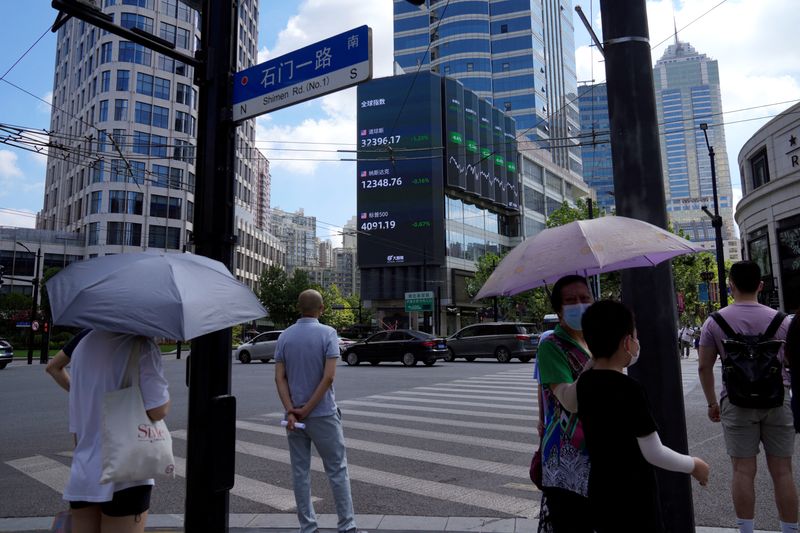 © Reuters. FILE PHOTO: Pedestrians wait to cross a road at a junction near a giant display of stock indexes in Shanghai, China August 3, 2022. REUTERS/Aly Song
© Reuters. FILE PHOTO: Pedestrians wait to cross a road at a junction near a giant display of stock indexes in Shanghai, China August 3, 2022. REUTERS/Aly Song
By Scott Murdoch
SYDNEY (Reuters) - The yen surged and Asian shares fell sharply on Tuesday after the Bank of Japan's (BOJ) decision to allow long term interest rates to rise more, a move analysts said could signal a step towards changing Japan's long-held yield curve control.
MSCI's broadest index of Asia-Pacific shares outside Japan was down 0.9%.
Japan's Nikkei Stock Index shed 2.2% after trading in positive territory earlier in the day, as stocks resumed trading following the BOJ decision.
In its final meeting of the year, the BOJ said its yield curve control (YCC) targets, set at -0.1% for short-term interest rates and around zero for the 10-year bond yield would remain.
But significantly it decided to allow the 10-year bond yield to move up and down 50 basis point each from the 0% target, against the previous 25 point each.
"The move came earlier than I had expected but a step towards the normalisation process of policy in Japan," Kerry Craig, JP Morgan Asset Management's global markets strategist, told Reuters.
"The market implications are most prevalent in the forex markets given the divergence between U.S. and Japanese policy settings.
"While there is still a wide gap, the hint that the BOJ is moving incrementally away from ultraloose policy should be yen positive in the near term."
The dollar dropped 2.43% against the yen to 133.62 after the BOJ decision, hitting a four-month low.
Australian shares extended earlier losses to be off by 1.27% in afternoon trade.
Hong Kong's Hang Seng Index was down 1.4% while China's CSI300 Index was off 1.15%.
In early European futures trading, the pan-region Euro Stoxx 50 futures were down 0.89% at 3,784, German DAX futures were down 0.91% at 13,888, FTSE futures were down 0.63% at 7,321.
U.S. stock futures, the S&P 500 e-minis, were down 0.52% at 3,825.5.
In Asian trading, the yield on benchmark 10-year Treasury notes rose to 3.6752% compared with its U.S. close of 3.583% on Monday.
The two-year yield, which rises with traders' expectations of higher Fed fund rates, was at 4.2662% compared to the US close of 4.262%.
Australia's Reserve Bank considered leaving interest rates on hold at its Dec 6 policy meeting, accoding to minutes published on Tuesday, but delivered a 25 basis point hike.
The Dow Jones Industrial Average fell 162.92 points, or 0.49%, to 32,757.54, the S&P 500 lost 34.7 points, or 0.90%, to 3,817.66 and the Nasdaq Composite dropped 159.38 points, or 1.49%, to 10,546.03. The three markets closed in the red for the fourth straight session.
"We might not get much of a Santa Claus stock market rally as Wall Street rushes to price in credit and earnings risks," OANDA analsyt Edward Moya wrote.
The S&P 500, the Dow and the Nasdaq are on track to notch their largest annual percentage losses since 2008, the nadir of the global financial crisis.
U.S. crude ticked up 0.7% to $75.71 a barrel. Brent crude rose to $80.44 per barrel.
Spot gold was slightly higher at $1,792.29 per ounce. [GOL/]

